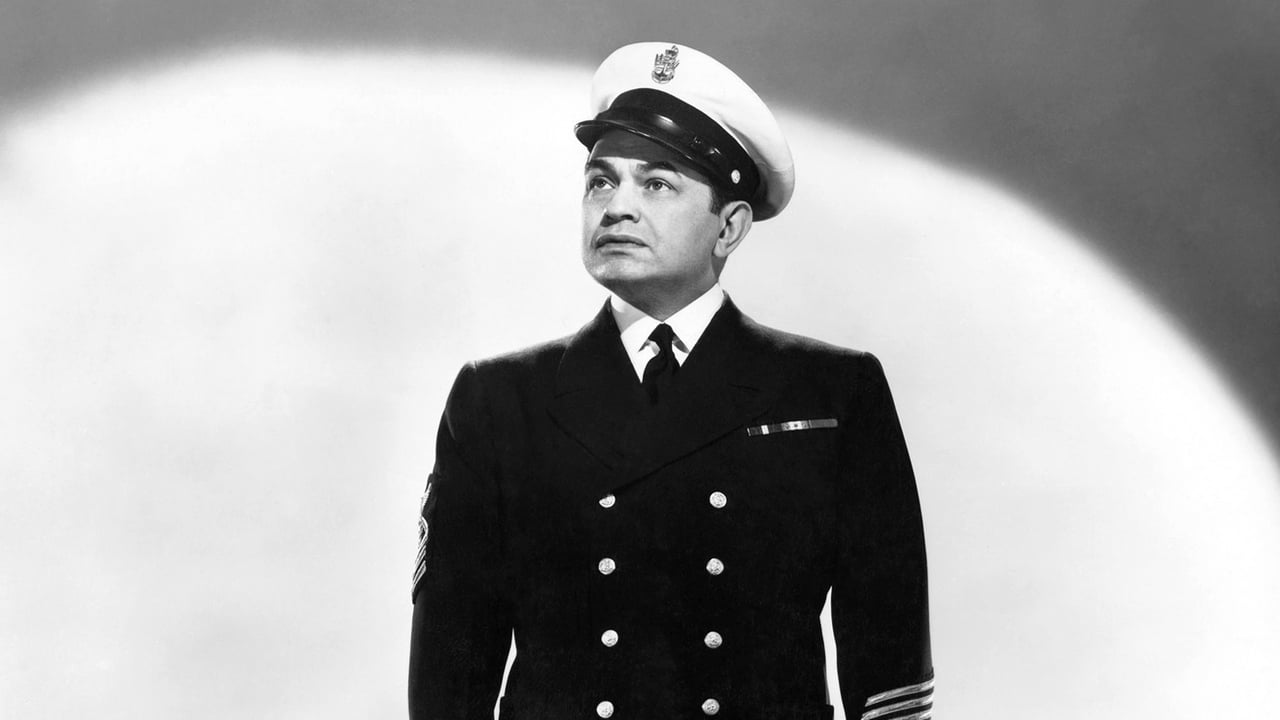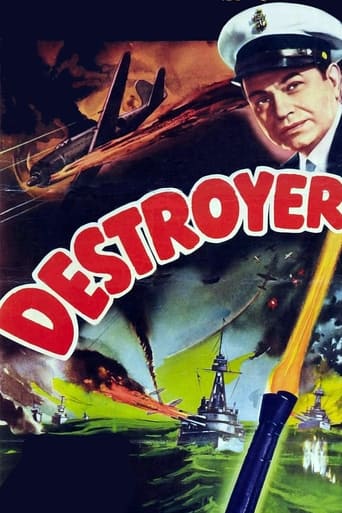



Better than most people think
There is just so much movie here. For some it may be too much. But in the same secretly sarcastic way most telemarketers say the phrase, the title of this one is particularly apt.
View MoreIt is both painfully honest and laugh-out-loud funny at the same time.
View MoreIt is neither dumb nor smart enough to be fun, and spends way too much time with its boring human characters.
View MoreEnjoyable WWII film about an aging sailor (Edward G. Robinson) coming into conflict with a young rival (Glenn Ford). It's all pretty by-the-numbers but some first-rate casting elevates it. Robinson excelled in playing parts like this. He brings a dignity and human touch to it that a lot of other actors wouldn't. Ford is great as well. This is young Glenn Ford before he developed his signature style where he always looked like he was ready to blow his top. There's good support from the likes of Edgar Buchanan, Regis Toomey, the very pretty Marguerite Chapman, and the always likable & funny Leo Gorcey. I'm sure people who are fans of these types of movies will enjoy it.
View MoreOthers have commented about the fine cast, good acting and relative action in this film. What many viewers – and most or all of the commenters so far – may have missed is that the story and script for "Destroyer" came from Frank "Spig" Wead. Wead had an illustrious Navy career in WWI and later. He was one of the very first Navy fliers and helped promote naval aviation. In 1926, he broke his neck when he fell down the stairs in his family's new home. His surgery was successful, but he had to walk with crutches or a cane the rest of his life. He retired from the Navy and began writing books and screenplays. The latter were mostly about the Navy and most were made into very good movies. When World War II broke out Wead was reactivated and helped with the planning and tactics involving naval aircraft in the Pacific. He went to sea and took part in several naval battles before finally retiring in early 1944. During the war and for several years after, he wrote the screenplays for a number of movies that Hollywood produced. Other big movies based on his books and screenplays include "Wings for Men" in 1931, "Test Pilot" in 1938, "The Citadel" in 1938, "Dive Bomber" in 1941, and "They Were Expendable" in 1945. Wead died at age 52 in 1947 after surgery. MGM produced a movie in 1957 about him, "The Wings of Eagles." John Wayne and Maureen O'Hara played Spig and his wife, Min.Something about this movie, with the fact the Spig Wead wrote the story and screenplay, leads me to believe that there is a subtle message in it. The film came out toward the middle of the war, with two more years to go (although no one could know that at the time). And look at the plot. A new ship is taken out for trial runs and has so many things go wrong that it had to come back for repairs at least three times. We see rivets popping, seams leaking, pipes breaking, motors and other things blowing. As a viewer, I thought that the critics in the movie were right. The ship was a piece of junk – in spite of Edward G. Robinson's pleas to the contrary. And, just think – if that happened with all or many ships, it's a wonder we had a Navy afloat at all to do battle. But that obviously wasn't the case – as the Navy brass ordered the ship to do mail delivery duty because it was unfit for service in the combat fleet. So, this ship just happened to be a lemon, right? Now think back to the opening scenes where Robinson is a civilian working on the crew that is building this new ship. Remember the several instances when he calls different workers to task for cutting corners? He tells one welder that he can't "cold" weld along a seam. The worker says that he can do that, and Robinson says that it would leak and he urges the guy to do it right. We see a few other subtle little scenes like this. I remember thinking that if that's the way the war-time shipbuilding yards were all working, they were sure doing a lot to help the enemy sink our ships. But the volume of records and evidence we have show that our wartime industries and workers took pride in doing their jobs right and well. They knew that the planes, and ships, and tanks, and weapons they were making were for the Americans and other fighting men who were defending freedom and our shores with their lives. They were their sons and brothers, husbands and fathers, uncles and cousins, and boy friends and neighbors. So, the workers took pride in what they did and in doing it right. That's why I think Wead wrote a subtle message into the screenplay – and Columbia kept it in the movie intentionally. It was a message to the home front workers about how important their jobs were and that they needed to do them well. The movie gave a picture of what could happen if the home front workers did sloppy work or cut corners. They would endanger the lives of many fellow Americans. They could cause the loss of ships, aircraft and battles. If you doubt this, watch the movie again, and watch for those instances of shoddy or faulty workmanship that Robinson points out to his fellow workers. And then watch for the problems they have during their trial runs to get the ship battle ready. I'll just bet that the home front workers who saw this movie in 1943 were more than a little upset at what they saw. And if it had been up to them in real life, all those goldbrickers in the movie shipyard would have been canned.
View MoreNot a bad little Columbia film from 1943; unheralded, but brisk and well made.EGR plays a retired naval officer now building ships during WW2. His old ship has been sunk and is being rebuilt. When it's done, he re-ups and gets assigned to the new incarnation of the USN destroyer, the John Paul Jones.Through a connection, he aces out Glenn Ford from his position, though Ford is far more qualified and up-to-date in his naval knowledge.EGR continues to irk everyone on the ship by riding them too hard and constantly babbling about the old JPJ. Finally, he strikes a fellow officer and is demoted and loses his position and must ask the re-instated Glenn Ford if he can even still serve on the JPJ. Ford doesn't like EGR, but says OK.The ship has a couple of test shake out runs where many things go wrong and the ship is finally assigned mail duty instead of the much desired combat duty. Tired of EGR and embarrassed by the ship, many men request a transfer off the JPJ until EGR corners them all and tells them the history of JPJ the man and his ship's battle with a British ship. The men are riveted by the tale of the bravery of the man and his crew who, against all odds, defeat the British ship as their own ship burns and sinks before which JPJ had yelled his immortal line to the British when asked if he was surrendering - "I have not yet begun to fight".The men stay on and find their ship in the middle of a battle with a Japanese submarine. The JPJ is torpedoed and is sinking and many of the man have abandoned ship as ordered. EGR asks permission to stay aboard to weld the damaged part of the ship....and they only have 2 hours before the Jap sub will surface and sink them for sure.Can he do it?Good male cast of characters- EGR Glenn Ford Edgar Buchanan Leo Gorcey Regis Toomey Edward Brophy Lloyd Bridges plus Marguerite Chapman as EGR's daughter.Leo Gorcey gets a good quote at a dance as he asks a girl to dance with him - "Hey, squirrel. Wanna twirl?"Edgar Buchanan at the same dance is asked by some woman what he will spend his paycheck on - 'Oh, I dunno. Some of it on beer. Some of it on women. The rest on something foolish, I guess'.Robinson tells his shipmates about the British in the Revolutionary War - 'Don't let anyone kid you. Those Limeys could fight!'And Leo Gorcey holds his own with EGR during the big JPJ story when EGR asks him to read the plaque that has the immortal line on it and Gorcey doesn't need to read it now and stares right up at the camera and EGR and quotes - "I have not yet begun to fight".Some good special effects in the film and snappy dialog. Well worth viewing.DESTROYER was issued on GOODTIMES HOME VIDEO in the 90s and wasn't easy to find then.
View MoreEdward G. Robinson cast's off in a rousing wartime tale of an untried destroyer crew pitted against the Japanese, and against their own ship. Robinson plays a dedicated machinist in a downright heroic role (for a change), and shows that he could lift this fairly routine combat epic out of the dull-drums -- almost on his own. The special effects and action sequences are first rate by the standards of the day, and overall the film has a good pace to it. It has been a few years since I have seen Destroyer, but the thing I best remember is Robinson relating the story of John Paul Jones and the Bon Homme Richard to the disheartened crew. Its corny and obvious, but he is so earnest that you practically feel like jumping in there to help him out.
View More